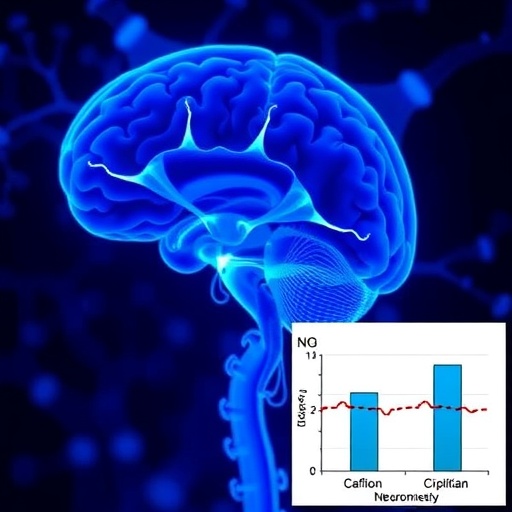Recent research emerged revealing the protective effects of Daflon, a natural flavonoid compound, against cisplatin-induced neurotoxicity in the cerebellum, which can lead to significant behavioral impairments and motor dysfunctions. Cisplatin, a widely used chemotherapeutic agent, is notorious not only for its efficacy in treating various cancers but also for its debilitating side effects, particularly neurotoxicity. This newly published study explores an innovative approach to mitigate the adverse effects associated with this potent drug, providing hope for patients who often suffer from these long-term consequences.
Cisplatin has been a cornerstone treatment in oncology for decades, yet its neurotoxic effect remains a crucial concern. Recent studies show that patients undergoing cisplatin therapy frequently report an array of neurological symptoms, including anxiety, cognitive deficits, and motor dysfunction. This research investigates the underlying mechanisms of these symptoms, particularly focusing on the role of the Toll-like receptor 4 (TLR4) and nuclear factor kappa-light-chain-enhancer of activated B cells (NF-kB) signaling pathways.
The cerebellum, a pivotal structure in the brain responsible for motor control and coordination, becomes adversely affected by cisplatin exposure, leading to symptoms such as ataxia and impaired motor skills. For this reason, understanding how to alleviate cisplatin’s harmful effects is of paramount importance in enhancing the quality of life for cancer patients. The study conducted by Fidelis et al. aptly identifies the potential of Daflon as a therapeutic agent in countering these side effects.
Daflon is composed primarily of diosmin and hesperidin, compounds that possess anti-inflammatory and antioxidant properties. The current research specifically posits that Daflon can significantly downregulate the activation of TLR4 and NF-kB signaling, both of which have established roles in neuroinflammation and subsequent neurotoxicity. Through this pathway, Daflon exhibits its capability to protect cerebellar neurons from cisplatin insult, marking a significant finding in the ongoing battle against chemotherapeutic side effects.
Further investigation into the precise biological mechanisms revealed that Daflon’s intervention leads to decreased inflammation within the cerebellum, as indicated by reduced levels of pro-inflammatory cytokines. This aspect of the study is particularly important, emphasizing that not only does Daflon protect against cell death, but it also restores normal neuroinflammatory processes vital for healthy brain function. Moreover, the study outlines how this reduction in inflammation correlates with improved behavioral outcomes in animal models.
The behavioral assessments conducted in the study confirmed that animals treated with Daflon displayed significantly less anxiety-like behavior and improved motor function compared to those administered only cisplatin. These findings provide compelling evidence for the potential of Daflon as a neuroprotective agent during cisplatin treatment. Such data underline the importance of continuing to explore plant-derived compounds, which could serve as adjunct therapies in cancer treatments.
In addition, the study reinforces the notion that chronic inflammation in the central nervous system can lead to depressive-like behaviors. Hence, by incorporating the therapeutic effects of Daflon, researchers are offering a multi-faceted approach to treatment that goes beyond mere cancer management, addressing the neurological health of patients as well. This is particularly relevant in a clinical setting, where side effects can significantly diminish the overall treatment experience.
While the use of Daflon seems promising, there remains a pressing question surrounding the translation of these findings from animal models to human patients. It is essential to conduct further clinical trials evaluating the efficacy and safety of Daflon in human subjects suffering from cisplatin-induced neurotoxicity. The significance of such studies cannot be understated, as the long-term quality of life factors must be examined, particularly for those enduring multiple cycles of chemotherapy.
Moreover, socio-economic implications come into play when considering treatment options involving adjunct therapies such as Daflon. The affordability and accessibility of these compounds in various parts of the world need to be thoroughly assessed to tailor cancer care effectively. Innovations in treatment strategies must not only focus on biological effectiveness but also on their implementation in diverse healthcare settings.
The findings of this research also promote the notion of personalized medicine, potentially paving the way for tailored therapeutic interventions that address individual responses to cisplatin and other chemotherapeutic agents. The integration of neuroprotective agents like Daflon can revolutionize the therapeutic landscape for cancer patients, leading to more holistic care models that prioritize both cancer eradication and neurological preservation.
In conclusion, the research conducted by Fidelis et al. underscores the critical need for multifaceted approaches to cancer treatment, particularly concerning the neurotoxic effects of essential chemotherapy agents like cisplatin. Daflon serves as a promising candidate to improve the quality of life for patients, highlighting the need for further exploration and clinical validation. As the understanding of cancer therapies evolves, the integration of neuroprotective strategies could offer a pioneering shift in how oncologists approach cancer treatment protocols and patient care.
The study marks a significant contribution to understanding the intersection between oncology and neurobiology, encapsulating the dual goals of effective cancer treatment along with maintaining better neurological health. Future studies may broaden the research scope by evaluating other similar compounds, enriching the arsenal of tools available against chemotherapy-induced neurotoxicity and enhancing the overall treatment experience for patients battling cancer.
Subject of Research: Neuroprotective effects of Daflon against cisplatin-induced neurotoxicity.
Article Title: Daflon attenuates cisplatin-induced cerebellar neurotoxicity, anxiety-like behavior, and motor dysfunction by downregulating TLR4/NF-kB signaling.
Article References:
Fidelis, F.B., Akhigbe, T.M., Oladipo, A.A. et al. Daflon attenuates cisplatin-induced cerebellar neurotoxicity, anxiety-like behavior, and motor dysfunction by downregulating TLR4/NF-kB signaling. BMC Pharmacol Toxicol (2025). https://doi.org/10.1186/s40360-025-01046-3
Image Credits: AI Generated
DOI: 10.1186/s40360-025-01046-3
Keywords: Cisplatin, neurotoxicity, Daflon, TLR4, NF-kB, cerebellar function, neuroinflammation, cancer therapy, anxiety, motor dysfunction.




